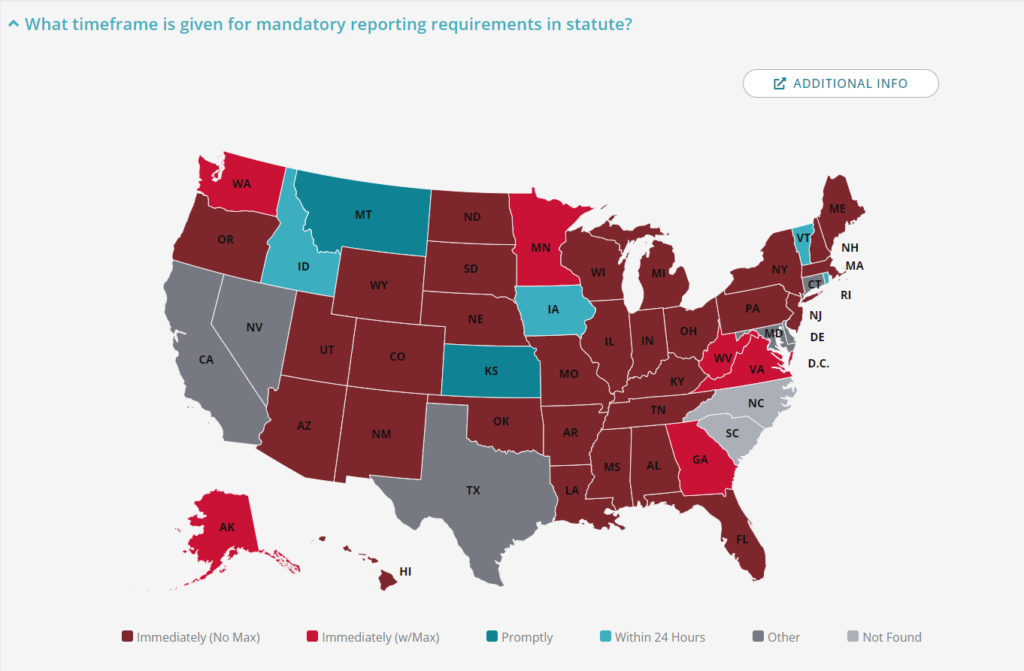
Laws regarding child abuse and neglect are largely created by state governments. This means that there are, essentially, 50 different approaches to protect youth and stop abuse and neglect. Increasingly, states have started to examine these systems and ask a crucial question: Do child abuse and neglect mandatory reporting laws prevent child abuse and neglect as we intend them to?
In 2022, Colorado joined that discussion. Through House Bill 22-1240, Colorado’s Mandatory Reporting Task Force was created and placed within the Office of the Colorado Child Protection Ombudsman (CPO). The task force is charged with issuing recommendations to address the child abuse reporting system’s disproportionate impact on under-resourced communities, communities of color, and people with disabilities through training and clarifying vague directives in the law.
To aid the task force in its important work, the CPO is excited to release this 50-state comparison resource that compiles information about mandatory reporting laws from across the country.
CLICK HERE to access the Mandatory Reporting Database
This resource features interactive maps displaying how each state answers seven questions in policy. States are color coded, allowing a quick understanding of various approaches taken throughout the country. By clicking on a state, users can see a direct quote from and citation of the relevant statute. An “Additional Info” button is also placed above each map, where users can read more about the trends found across the states for that topic as well as highlights of unique policy approaches. Finally, users interested in accessing a spreadsheet with all information for every state across all seven questions can press the Download Data button.
Colorado’s Mandatory Reporting Task Force
Mandatory reporting is the legal requirement for people in certain occupations (or, in some states, all individuals) to report suspected child abuse and neglect Colorado’s task force is required to analyze 19 policy components regarding mandatory reporting and may make recommendations to Colorado’s policymakers on changes to update the state’s mandatory reporting laws. The task force must also analyze national best practices. The CPO created this resource to help the task force accomplish these goals. It has also decided to make this database available to the public so that others can also learn about mandatory reporting laws in all 50 states.
Database Overview
The questions addressed in this resource were driven largely by the specific directives issued for the task force to analyze. For instance, the first section presents each state’s answer to the question of “what timeframe is given for mandatory reporting requirements in statute?” As can be seen on the corresponding map, many states require reports be made “immediately”, with some providing additional guidance by specifying a maximum amount of time that can be allowed to pass by before the report is made By clicking on Minnesota, for example, a user can find that the state specifies that “’Immediately’” means as soon as possible but in no event longer than 24 hours”. The screen that appears once the state has been clicked shows both the direct quote of relevant statute, as well as citations of that statute so users can find additional context if they are interested. And, by clicking on the “Additional Info” button, a user may read a brief summary and trends analysis of reporting timeframe policies, including a breakdown of which states require reporting within 12, 24 and 48 hours. This data directly corresponds to the legislation’s requirement for the task force to analyze “the definition of ‘immediately’” by considering how other states have formed their timeframes in law.
The task force is also charged with addressing the disproportionate impact that mandatory reporting systems have on under-resourced communities, communities of color and people with disabilities. This includes addressing implicit bias and drawing attention to how it leads to inequitable outcomes for those communities. One section of this resource is dedicated to highlighting states whose mandatory reporting statutes explicitly address implicit bias or diversity, equity and inclusion. The map calls attention to policies in Colorado, DC, Illinois and New York. By clicking on those states, users can read the statute for themselves and see where those statutes are located, and by clicking the Additional Info button, users can read a summary of those policies.
The seven questions addressed in this resource are:
- What timeframe is given for mandatory reporting requirements in statute
- Does statute limit the requirement to report concerns of abuse or neglect to circumstances mandatory reporters encounter in their professional capacity?
- Does statute enable or prohibit institutions from developing internal policies to assist mandatory reporters in fulfilling requirements?
- Does notifying a supervisor of a concern of abuse or neglect, or delegating the reporting responsibility to another, satisfy the reporting requirement in statute?
- Does statute include “medical neglect” or lack of medical care in definitions related to child abuse and/or neglect?
- Does statute regarding mandatory reporting explicitly address implicit bias or diversity, equity and inclusion?
- Does statute address training requirements for mandatory reporters?
The CPO invites users to dig into this interactive resource to learn more about how states across the country tackle important child welfare policies in statute. Research of statutes for this resource was completed during December 2023, and will not be updated. This resource was created by the CPO’s Public Policy Analyst Bryan Kelley. Please feel free to contact Bryan via email with any questions or concerns.
To learn more about how to use the database, watch the “how to” video below.
